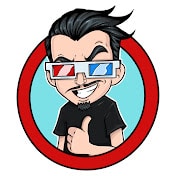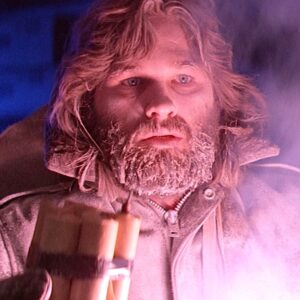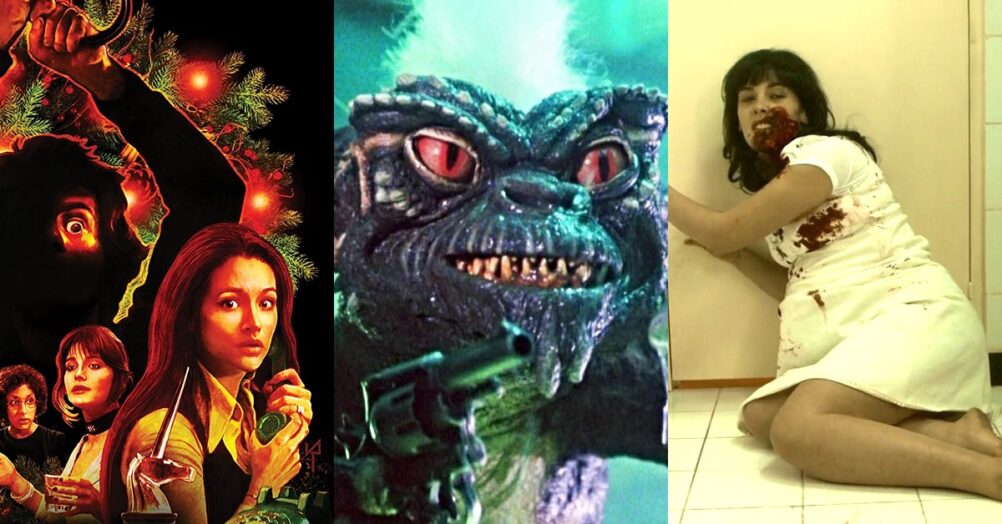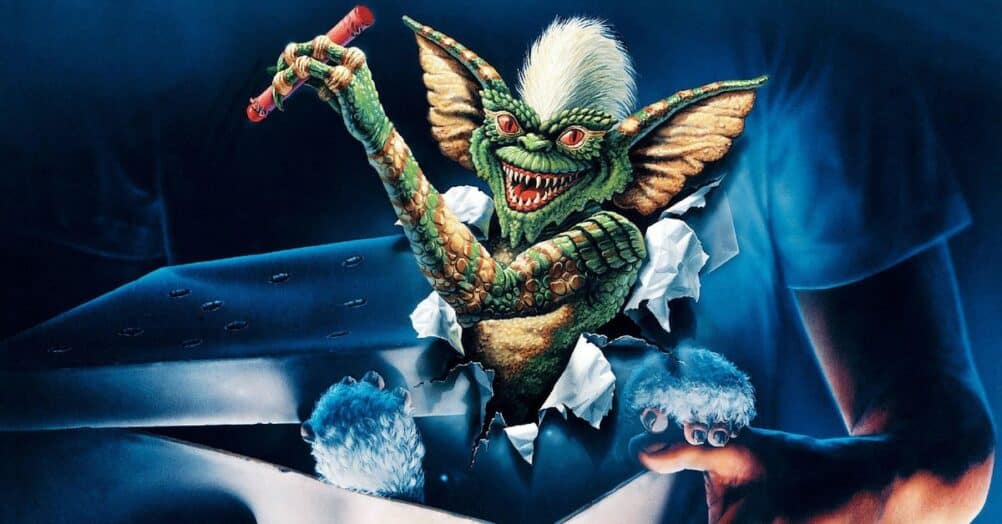Last Updated on October 10, 2024

Got a chance to sit down for two group interviews on the set visit for THE FOG remake. The first was with horror guru John Carpenter and producer David Foster. It became pretty clear, pretty quickly, that for better or worse, Carpenter is just not that involved in the remake and was never interested in being so.
Nevertheless he spoke on many interesting topics. Just don’t ask the guy about HALLOWEEN, and God help you if you reference him being an icon.
Why remake The Fog?
JOHN CARPENTER: Why not? If everybody else is making remakes and they want to pay me money to make a remake of an old movie of mine, why not? It’s a good idea.
DAVID FOSTER: And it’s so much more advanced, too.
CARPENTER: Seriously, it’s–that’s part of the answer, but my ex-partner Debra Hill, who just recently died, has been trying to get this off the ground. We hooked up with David here, who finally did get it off the ground, and it was kind of nice for her to see this being made.
Can you talk about the key differences between this version of The Fog and the 1980s version?
CARPENTER: Well, the styles are different; the actors are different; the director’s different. It’s essentially the same story with some basic changes in it, but it’s fog and ghosts.

Any of the changes you can talk about?
CARPENTER: I have been sworn to secrecy in that matter.
FOSTER: I tell you one thing he said to me–John–when I asked about the first one. He said, ‘Well, I did it for $2 million and two fog machines.’
Why did you decide to hand this over to another director instead of remaking it yourself?
CARPENTER: I don’t want to remake this. I mean, I did it once. This was not my favorite experience of my own career making The Fog. It was difficult. We had to go back and fix it once we shot it. I’ve done this once. Let some younger person do it.
So why not go back and do it right the second time?
CARPENTER: Well, I just explained. I don’t wanna…
What’s your role in this production?
FOSTER: Producer. He produces.
CARPENTER: Well, I am a producer, but I come in and say hello to everybody. Go home.
FOSTER: We listen to him a lot. He obviously knows what he’s doing when it comes to scaring people. And this should be a scary movie and in truth, I must talk to John at least three or four times a week. Sometimes I’m griping; sometimes I’m happy. But we listen to him because, you know–and he gets crazy when you say it like the icon that he is and the master that he is.
CARPENTER: Please stop.
FOSTER: See, I embarrass him, and I know it would embarrass him, but it’s true. He has a great sense, and it’s difficult for him to talk about that, you know.
CARPENTER: I’m just a f*cking bum, OK?
FOSTER: No you’re not. You’re a good friend and a smart guy.
Speaking of masters, what’s going on with Masters of Horror?
CARPENTER: Well, it’s a little series that we’re doing for Showtime. We have an hour–each of us has an hour to shoot in 10 days. And the first director they got was John Landis. He’s now way over budget and way over schedule. So there may not be any more Masters of
Horror. He may do them in. Dario Argento starts next week. They pushed me later on the schedule because they’re going to take all the money out of my show and put it into everybody else’s.

Now, you’re listed as the screenplay–as a writer for the film–
CARPENTER: Which film?
The Fog. So–but so is Cooper Lane. Why did you choose Cooper Lane as a–
CARPENTER: I am?
FOSTER: Well, to be correct about it, John and Debra get credit for originating the first screenplay. Not this screenplay. And the credit for this screenplay, so we don’t get in trouble with the Writers Guild of America, is–this screenplay is written solely by Cooper Lane. Debra was not well when all this happened. And as John said, he’s done it once. He made it very clear he didn’t want to do it again. And so we hired this bright, young guy and he’s done a wonderful job and he gets the sole credit for writing this version.
Anything in particular about him that’s sort of–besides he was bright?
FOSTER: You know, he wrote a fabulous script for me–
CARPENTER: Talent.
FOSTER: Yes, talent.
CARPENTER: An important thing.
FOSTER: He wrote a wonderful script, actually, on The Core, which was an original screenplay. And then I happened to like the picture a lot. It didn’t do very well. I think I know the reason very clearly. It opened the week that we invaded Baghdad and everybody was home watching CNN and no one was going to the movies that week, and that was our fault. And–but it was a wonderful script.
He wrote another that Warner Brothers bought, a Western called El Dorado. He’s just a really good, talented, fresh, new writer. And John and Debra read some of his work before we hired him because they had to approve of him, and the studio, and everybody agreed that he had a good take on it. The rest, as they say, is history.

Given the inconsistent success of recent remakes of horror movies, were there anything—was there anything that you were insistent remain in the original or insistent that they change to update it or potentially improve it?
CARPENTER: In the case of The Fog, it’s a pretty fireproof idea in terms of what happens. It’s an old ghost story. The idea in this case is to freshen it up. And as a cultural mindset these days, it says if anything’s over 15 years old, it’s old fashion and old school. But we’ve sort of heard of it. Audiences have maybe heard of it, so the thing to do is to take it out and prop it up and put some—a fresh coat of paint on it and see how it goes.
FOSTER: And we have popular, young actors too, which was a very specific plan, you know, to–Tom Welling is really poplar with the young people. Lost is a very popular series with all kinds of people. And then Selma, who’s also young, but she’s not a television star. She’s sort of blue to the young people, you know. And it was a very calculated thing. These pictures succeed or fail based on the young people who are going to the movies, and mostly young girls. It’s amazing. Young girls.
FOSTER: John and I did–he did, I went along for the ride– The Thing, which was a horror film. It was a great film, I think, and we’re now going to do a miniseries out of it for the Sci-Fi Channel.
CARPENTER: Which you promised me some money from. Where is my money?
FOSTER: That’s their money. It’s not my money. It’s Universal. Go talk to them. But–
CARPENTER: That’s what I thought.
FOSTER: Yeah, well, it’s them. It is them.
CARPENTER: Yeah, I know.
The original Fog didn’t really skew younger in the way that this version does. What do you think has changed in the world of horror since the original Fog came out? Were you–now you have Tom Welling instead of Tom Atkins.
CARPENTER: That’s a different era. That was 1979 when we made that. It’s just a whole different time now. We didn’t have the Internet. Thank god we didn’t have computer generated graphics, and the whole celebrity showbiz thing was different then. It’s a different time and horror movies and science fiction used to be–used to be portrayed with older folk in them, a little more mature I should say.
Vincent Price.
CARPENTER: Oh, yeah. But no more.

I was wondering if you have anything to do with the score on this one, and if not, if you think it will be similar.
CARPENTER: Well, first of all, no one’s really asked me to do it yet, but–
FOSTER: That’s not true.
CARPENTER: I know that’s not true. You’re right. The best thing–I think the easiest thing for all of this is to take the first score and have someone freshen it up. Everybody’s getting freshened up, so why not? I’d love to. It’d be great. On the other hand, there are a lot of
really interesting composers right now doing movies for low budget, high budget. It’s really an interesting time. So it’d be also fun to see what somebody else’s take on it would be.
FOSTER: We actually talked about taking what he did on something, taking his original score and having a contemporary arranger dig into it and contemporize it. And I’ve actually asked John if he would consider doing a new score. He said he might. No definitive answer. And then there’s other composers out there. As he said, some young,new guys out there. So we truly are more intrigued with taking the original score–it seems that everybody knows that score somehow–and just adding a contemporary feel to it.
You mentioned something, a comment a couple of minutes ago about ‘thank god we didn’t have CGI back in the day.’ So that begs the question, for this particular outing, are you going to employing CGI to help recreate The Fog, or are you going to be using a combination of things with CGI? How are you going to handle that?
CARPENTER: The Fog is going to be dealt with in a couple of different ways, practically and with computer graphics.
OK, so a combination.
CARPENTER: Yeah, to give it a little–yeah, to help us out there. But see, I don’t–this is my own opinion—I don’t think CGI in it of itself is very scary. Creatures don’t look too scary; look fake. Things don’t move; they move too fast. There’s no inertia and so–
FOSTER: It’s interesting. One of the studio executives–I don’t know if you were there the other day when I was talking to Derek–he said he saw a picture and he felt he was so aware of what was CGI and what was real, and he preferred the real.
CARPENTER: I shudder to think what The Thing would look like if we had to do it with computers. Honestly. I just wouldn’t—it wouldn’t — it wouldn’t work.
I shudder to think what the cast would be today.
CARPENTER: Oh, but they could do a good job with that. They could do a good job with that. There are some good actors.

You all talked about sort of getting a younger cast, appealing to the younger moviegoers, so is–can we take from that that the movie’s probably going to be PG-13–is what you’re shooting for? And did that—because I mean, we’re talking about some potential for some fairly graphic stuff going on with the ghosts and also–
FOSTER: PG-13.
OK. Was there any sort of, not creative compromises, but sort of creative solutions you had to find to kind of bring across the horror you wanted to to make sure that it wasn’t too splattery?
CARPENTER: The horror I wanted to?
Or David–
CARPENTER: I’m just a producer on this. I sit at home and watch basketball games on TV. These guys go out and make this movie, all right? It’s designed to be a PG-13 film.
You know, horror’s really changed a lot. It used to be much more hardcore. Today is drifting towards PG-13 and you know, getting girls in, and girls don’t like yucky stuff. You know what I mean? Did you have any final say on the script? I mean, from what we saw down there today, did you approve that, put your stamp on it?
CARPENTER: I read it. I liked it. But you know, the script has evolved. It keeps changing as you make a movie. Look, my own philosophy is it’s a director’s film. It’s not my film anymore. I made my film back then when I was young and happy. This is a new director and he’s bringing his point of view and his sensibility to this film. And I have a real hard time, you know–I have a real hard time telling anybody else what to do or interfering with their vision. You know, it’s his movie now.
But doesn’t it concern you with your name attached to it, that people will–it might taint what–you know, you did the classic original, and that if fans really hate this movie or dislike it in anyway, that–
FOSTER: They’re going to love it.
They may love it, but if they do dislike it, does it worry you that your stamp is on it?
CARPENTER: Nothing worries me anymore. Nothing. No, what are you going to do? What are you going to worry about? Why worry?
Well, I mean, for people like George Romero, he had nothing to do with the Dawn of the Dead remake, so if it stunk, it was, you know, not his problem. Nobody cursed him for it, you know.
FOSTER: No one’s going to curse John for this. I mean, it’s–you know, it’s a Rupert Wainwright film.
CARPENTER: You’re treating the original like it’s–the original is not one of my favorites of my own movies. It’s OK. It’s OK. No matter what he does, it’s great. It’s great.

How does the budget of this one compare with what you had for the original, and where is the money going?
FOSTER: None of your business!
CARPENTER: Good answer. We had $1 million and they have a whole lot more than we did, a whole lot more.
FOSTER: Well, everything’s more expensive now. Actors are more expensive; directors are more expensive; CGI is expensive.
CARPENTER: Living is expensive; buying cars is expensive. Everything. The whole world has changed.
But by today’s standards, is this still considered a low budget film?
FOSTER: No. Modest.
CARPENTER: What, do you mean $200 million movies? It’s–compared to that it’s low budget, yeah. Yeah.

I know this kept coming back and back, but Big Trouble in Little China — is there any idea or thought in your mind of doing a sequel or building on that?
CARPENTER: Since that movie tanked, I don’t think they’ll ever do a sequel.
But knowing that because it’s reached a cult status since and that there is a market there, there is an audience for it, would you do it on a smaller budget or something on a smaller scale that would definitely, 100 percent be profitable?
CARPENTER: That’s another one of those things. I’ve done that once. I don’t want to do that again. Yeah, let somebody else do it. Plus, I don’t own it. You know, I don’t have any stake in that, so–
I read on the IMDB that you were inspired–
CARPENTER: On the what?
On the Internet Movie Database.
CARPENTER: Thank you very much.
–that you’d been inspired to do The Fog from a British movie called The Trollenberg Terror.
CARPENTER: Crawling Eye, huh?
The Crawling Eye. Have you ever been interested in remaking that?
CARPENTER: You know, I never thought about it because it’s such a ridiculous title. I remember seeing that movie when I was a kid and I was really impressed with it.
FOSTER: What’s the movie?
CARPENTER: Well, in England it was called The Trollenberg Terror. And in this country they released it as The Crawling Eye with Forrest Tucker in the lead.
FOSTER: Oh, my god.
CARPENTER: British film. It was based on a–they did a TV series on it, and that’s where it came from. It was really interesting. It all comes from the quasar mass stuff. I’d do it if somebody asked me. I’ve always wanted to do X the Unknown again. I thought that was a great film. I love that movie.
I’d like to know about the comic book tie-in, and do you guys know anything about that? Will it be like a Tales from the Crypt sort of looking and feel?
CARPENTER: I have been sworn to secrecy on the comic book. But I just saw the cover.
Oh, were you impressed?
CARPENTER: I was unbelievably impressed. Very beautiful, very nice.
But it is a prequel?
CARPENTER: Oh, way, way, way prequel. I mean, a way, way, way, way prequel.

What does Rupert Wainwright bring to this creatively that, you know, that you thought he was the right person to tackle this?
CARPENTER: Energy. His style is vastly different from mine. He uses–I don’t know how to put this–he uses inserts and close-ups to add texture and energy to it—to his movies, which is totally different from the way I work. That would be an interesting try on this film. See what we do.
I was just curious if there was a remake you have seen that you thought was better than the original. I mean, the only one that always comes to mind to me is The Thing, as far as being superior to the original.
CARPENTER: I don’t know about that. The Thing—the original Thing is pretty great. That was a great film.
It’s a fun–I liked it too, but–
CARPENTER: I liked the American version of The Ring better than the Japanese version. I thought they actually improved on it. It still doesn’t make any sense. It’s not a sensible plot, but there were some things about the American version that I thought were–the timing, the tempos, the style was a little bit better, I thought.
So with the Sci-Fi Channel version of The Thing, is that a remake or is that sequel or is that an extension?
FOSTER: It’s a remake.
And it’s going to be using CGI or just practical–
FOSTER: I’m sure there’ll be CGI. We’re just getting the script four hours–two to our–we have the first night and then we’ll wing the second night. It’s not been green-lit yet. It depends on the second night’s–
Is it all based on the comic series?
FOSTER: Excuse me?
I said is it all based on that Dark Horse series? Because I’d love to see that made.
CARPENTER: That would be a great–that’s a great sequel to the original movie, The Thing. That was great, well-done, well-written.
Did you have anything to do at all with The Thing video game that came out?
CARPENTER: I’m in The Thing video game. I’m a character in it. You didn’t realize that? I’m Dr. Faraday and I get killed. That pissed me off, OK.
Speaking of doctors, will there be another Dr. Phibes in the odd remakes?
CARPENTER: There was. You know, I’ve forgotten that. Alzheimer’s has started to kick in with me, so you’re going to have to remind me of all this stuff.
In correlation to that though, there are actually a lot of nods in the original Fog. A lot of characters like Castle and Dan O’Bannon and the Dr. Phibes, so are there any other sort of like, in-jokes or nods in this film? Anything extra–
FOSTER: Same names. Same characters’ names. Everybody–I wanted to change them actually, but everybody said, ‘No, no.’ Everybody knows those names, so why fool around?

Is there going to be a lighthouse in this one?
CARPENTER: God, I hope so. I’ve seen it in film; I’ve seen it in the dailies. Unless they cut it out, there should be one.
With the train of directors lately going back and tinkering with
their work, reediting, reimagining, not actually remaking, but just doing rereleases, is that something that interests you or do you just like to–
FOSTER: The director’s cut.
CARPENTER: God no. If I’ve finished a movie, that’s my movie. I don’t want to f*ck with it. These guys don’t–these guys don’t have enough to do? They don’t–they want to remake their film. See, I don’t understand it. It’s insane.
We’re going to get back to the anthology series. You said that you’re going to be doing it, but you didn’t tell us anything about the story or the idea for it.
CARPENTER: The story was written by Drew McWheeney. Do you know who he is and his partner? He was on Ain’t it Cool News? He’s writing the screenplay. It’s called Cigarette Burns and it’s something, you know, I’ve never seen anything else like it. Really unique. We shoot it in 10 days. I’ll be shooting in July at some point. As I say, the first director up was John Landis. Last night I just had dinner with Dario Argento. He’s the second one up. They’re going to kick the crew’s ass, so by the time I get there, you know, they’ll–it’ll be fun to do. It’ll be a lot of fun to do.
You mentioned that The Fog wasn’t particularly one of your favorite of your films. What is your favorite film?
CARPENTER: I think probably The Thing. That was one of my real favorites, you know, just because. I don’t know why. Just because. It’s the darkest–it’s the darkest.
So there you have it. John Carpenter is truly a man who doesn’t give a shite about anything except for what he chooses to give a shite about. Think what you will about that, because he won’t care one way or the other.


































Follow the JOBLO MOVIE NETWORK
Follow us on YOUTUBE
Follow ARROW IN THE HEAD
Follow AITH on YOUTUBE